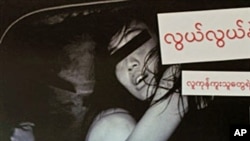A new report from a South Africa university says warnings by NGO and church organizations there would be a massive increase in human trafficking in the country during the World Cup greatly exaggerated the problem.
Loren Landau, director of the Forced Migration Studies Program, tells VOA that warnings that tens of thousands would be trafficked during the World Cup were alarmist and not substantiated by the evidence. He adds that the evidence shows that during the 2006 World Cup in Germany a total of five people were trafficked - when predictions had suggested 40,000 would be.
In its research, the program, based at Johannesburg University of the Witwatersrand, determined that the number of trafficked individuals in South Africa per year is around fifty. Landau tells VOA that exaggerating the problem is harmful in several ways, including that millions of dollars which could be spent on more serious problems, is going to a relatively small trafficking problem.
"Not to say those [trafficked] people didn't need help, but in an area where there is massive sexual violence, where there is massive labor exploitation, where there is smuggling and exploitation on the [borders] that has nothing to do with trafficking, those are all issues where that money would be better spent," she said.
Landau says exaggerating the issue inevitably leads to criminalizing people who should be protected.
"One I think it further criminalizes sex-work - there is a lot of sex-work in southern Africa undoubtedly, some of that is voluntary, in fact much of that is voluntarily and not all of it has to do with trafficking and exploitation. Second it criminalizes migrants, and it considers this issue as an issue of law enforcement rather than sort of an economic, normal kind of issue," said Landau.
Researchers found that migration for sex work is often merged with trafficking, and that in fact most foreign sex workers, whether legal or not, are in South Africa by choice. Landau says some may have become sex workers because other work was not available to them, and that many sex workers are exploited - but that most have not been trafficked.
Landau notes that there are many reasons why the issue of trafficking is so often exaggerated, and not the least of them is because of its emotive impact.
"This is an issue as I've suggested that appeals to people's emotions - they are afraid of what is happening, it is obviously not a good thing; and it appeals I think to the savior mentality of a lot of western countries, and a lot of westerners about trying to fix the problems of the third world," she said.
Landau says if migration to South Africa was made easier and sex-work decriminalized it would greatly reduce the opportunities to exploit foreigners and ensure that in time they are able to contribute more to the economy.
SA Report: World Cup Human Trafficking Warnings Exaggerated




